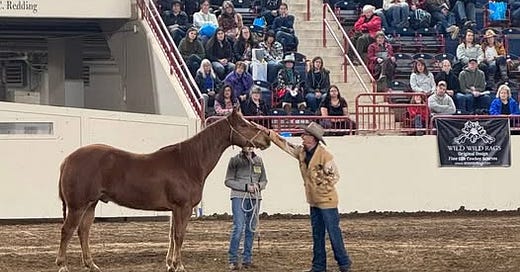This is the complete article written on Facebook from Warwick Schiller, a highly acclaimed Aussie trainer now living in the USA.
He has a FB page called Warwick Schiller’s Attuned Horsemanship, and a huge podcasting audience called Journey On. His Facebook page can be found HERE.
His most recent article is too good not to share it here as a complete article.
He couldn’t have put it better.
Reflect. I see this all the time, and it makes me cringe!
Yes it is long, but worth the read.
INAPPROPRIATE TOUCHING
I'm reading an amazing book called Amphibious Soul by Craig Foster, the Academy award winning documentary film maker of "My Octopus Teacher".
If you haven't read it, I highly recommend it, it is simply profound.
In the book he says "As a rule, I never touch an animal unless they touch me first".
In my work building relationship with horses, I do this too. Most times a horse will touch you with their nose/muzzle first, and matching that greeting (versus labelling the horse as a biter) is a game changer.
But there's a phenomenon I have noticed going on with people trying to build relationship with their horses that I have labelled "inappropriate touching", and it looks a bit like the photo below.
This picture was taken at a horse expo in Pennsylvania recently, where I worked with a demo horse who has a "biting issue". He would reach out in a way that his owner termed as nipping, whereas I interpreted as him saying hello, similar to reaching out to shake hands with someone.
When he reached out I would greet him with a flat hand that he is able to to nuzzle, lick or even scrape his teeth on. After doing this a while his snappy acting motions got less so, and he was no longer needing to say "hey, pay attention" , but was more "hey, how's it going".
I was explaining to the audience that I was meeting him in the way that he was meeting me (with his muzzle) and that it's not an invitation to touch other parts (yet).
I then said that it's many people's default to reach up and rub a horse between the eyes, whether that's what they are offering or not, and that if you do, it's inappropriate touching and it gets in the way of connection. It doesn't meet their needs, and is all about yours.
With the horse in the picture, he'd been engaging me with his muzzle, and I said to the audience "watch what happens when I try to rub him between the eyes". As you can see in the photo, he has raised his head up and is clearly indicating "No, not there, on my muzzle".
We had a Connection And Attunement retreat here at the Journey On Ranch a week ago, and I used my wife Robyn to illustrate this point to the participants. I said "imagine I'm at a gathering and meeting Robyn for the first time".
We walked up to each other in that way people do when they see someone new and they can tell an introduction is shaping up, Robyn reached out with her hand to say hello and instead of me reaching out to shake her hand, I gently reached up and lightly brushed a wisp of hair from her cheekbone and tucked it behind her ear.
The participants all gasped and the ‘ick factor’ was high.
Even though it was caring, and gentle, it was inappropriate at that moment.
Now, I'm not saying you can't rub your horse on the forehead. I'm saying if your horse has a dysregulated nervous system around humans because it doesn't feel seen (and safe), try to meet their needs first before trying to get yours met.
I recently saw an Instagram post from a University in the UK. The professor explained that they were studying horses to determine their levels of stress. In the background, a horse was standing with his head out over a Dutch door.
While he was explaining their investigations on stress, a female student (or maybe another professor, I don't know which) walked up to the horse. The horse reached out with his muzzle to greet her.
She ignored this and reached up to rub the horse between the eyes.
He turned his head 90 degrees to the left to communicate that wasn't what he was offering.
Her hand followed him and kept rubbing.
He then turned his head 180 degrees to the right, saying, "No, not like that".
Smiled, gave him another pet between the eyes, and walked off camera.
While the professor was saying that they are doing experiments determining the amounts of stress horses are under, someone in the background was actually creating stress, without either of them even knowing it.
Once you understand how sentient horses are, and how subtle their communication, you can't unsee it.
Please let us know what you think of this article in the comments.
There is a lot to unpack.
Do you, too, get the “ick factor” around certain people and their inappropriate ways of seeing, dealing with, and treating their horses?
I am the same with anthropomorphism………
Sentient doesn’t mean human-like…….. It means able to feel and perceive things.
Or being conscious of responding to sensations,
finely sensitive in perception and feeling,
aware.
We must adjust our way of thinking to understanding how they perceive things.
Next week I will have another article on Warwick - stay tuned.






Ahh, this is so true. When you play with foals as we do, we’ve learned this on steroids, as they don’t want to be touched anywhere for any reason. When you interact with foals, you come to understand how much horses tolerate from us two-legged predators, and touching is only the beginning.
Thanks for the restack